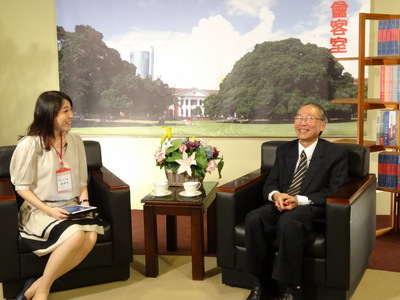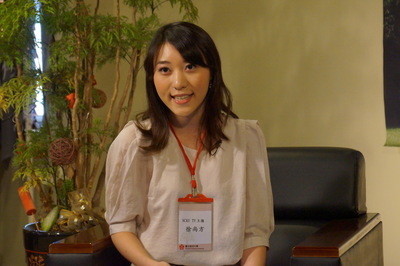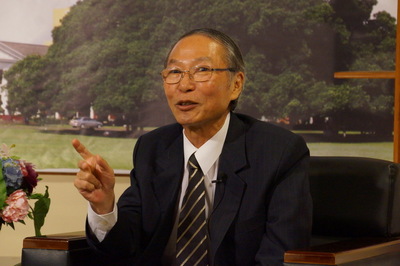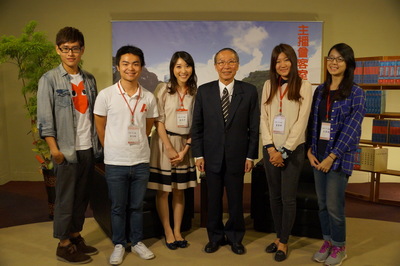NCKU president talks about learning for use at Student Anchor Salon




Tainan, Taiwan, October 14, 2013
The National Cheng Kung University (NCKU) News Center recently hosted an exclusive interview with NCKU President Hwung-Hweng Hwung, where the student anchors invited President Hwung to give a talk on learning for use.
President Hwung said that learning for use involves two levels. “The first level, which is viewed from the vocational perspective, refers to successfully entering into the job market after graduation, whereas the other level points to the application of advanced research to solve problems in the industry, enhancing productivity and improving quality.”
In the interview hosted by student anchor Felicity Syu, a senior from the Department of Chinese Literature, on October 3, President Hwung also talked about how NCKU apply the research findings in the fields of science, engineering and humanities, the mission of the NCKU Club, and how the academia could use resources from the industries.
According to President Hwung, NCKU has been endeavored in academia-industry cooperation for years. One example given by President Hwung in this context was Tainan Hydraulics Laboratory (THL) at NCKU.
“If Taiwan wants to build any harbors or carry out ocean engineering projects, prior research and testing need to be carried out at NCKU THL,” added President Hwung who stressed on the importance of 39-year-old NCKU THL to the research in fluid mechanics and ocean engineering.
“General engineering staff are unable to carry out such research alone; hence, the only way out is to launch cooperation between the academia and the engineering industry to ensure that the engineering project quality fulfills safety requirements.”
The newly established “NCKU Club” was another effort of close ties between the academia and the industry.
President Hwung said, it is known that research capability concentrates within universities but what is not fully understood by outside community that to solve problems in the industry sometimes may require assistance from the university.
Therefore, a mechanism has to be built to establish mutual understanding, whereby firms have to visit universities and apply research outcomes wisely while universities needs to develop and market their research outcomes in order to acquire more funds.
Such a relationship will definitely be able to sustain great research capability in the university, thus pursuing academic excellence.
The NCKU Club, according to President Hwung, has started collaborations in the field of engineering, biomedicine, nanotechnology and optoelectronics and will definitely extend such collaborations to other fields in the future.
President Hwung also cited Nobel Prize winners as example and noted that those winners have forward-looking visions by carrying out research that make contributions to mankind, thus encouraging and inspiring professors and students in the academic world to turn their research into application to create value and bring benefits to the society.
It is known that NCKU’s roots were engineering, so how can humanities and social sciences establish academia-industry collaboration, Syu asked.
President Hwung responded that a research center needs to be established first to gather efforts from different people and expand the level of research.
For instance, the Department of History can collaborate with the local government to write articles related to local history whereas College of Social Sciences can come up with solutions focusing on various public issues to help government units solve problems. President Hwung emphasized on the importance of moving with times in terms of perspective and progressing with the society.
When asked to give advice to future graduates entering into the job market, President Hwung said, “Follow your heart, plan your own life, position your needs and do not blindly follow social trends.”
He admitted that Taiwan has put too much emphasis on academic degree as he has never seen presidents or ministers have that many PhD degree holders. “Even the President of U.S.A himself does not even hold a PhD degree,” he said.
President Hwung also advised students to be sure of what they want to do and not blindly pursue academic degree, while not forgetting to ask for advices from parents and teachers before making any decision.
The National Cheng Kung University (NCKU) News Center recently hosted an exclusive interview with NCKU President Hwung-Hweng Hwung, where the student anchors invited President Hwung to give a talk on learning for use.
President Hwung said that learning for use involves two levels. “The first level, which is viewed from the vocational perspective, refers to successfully entering into the job market after graduation, whereas the other level points to the application of advanced research to solve problems in the industry, enhancing productivity and improving quality.”
In the interview hosted by student anchor Felicity Syu, a senior from the Department of Chinese Literature, on October 3, President Hwung also talked about how NCKU apply the research findings in the fields of science, engineering and humanities, the mission of the NCKU Club, and how the academia could use resources from the industries.
According to President Hwung, NCKU has been endeavored in academia-industry cooperation for years. One example given by President Hwung in this context was Tainan Hydraulics Laboratory (THL) at NCKU.
“If Taiwan wants to build any harbors or carry out ocean engineering projects, prior research and testing need to be carried out at NCKU THL,” added President Hwung who stressed on the importance of 39-year-old NCKU THL to the research in fluid mechanics and ocean engineering.
“General engineering staff are unable to carry out such research alone; hence, the only way out is to launch cooperation between the academia and the engineering industry to ensure that the engineering project quality fulfills safety requirements.”
The newly established “NCKU Club” was another effort of close ties between the academia and the industry.
President Hwung said, it is known that research capability concentrates within universities but what is not fully understood by outside community that to solve problems in the industry sometimes may require assistance from the university.
Therefore, a mechanism has to be built to establish mutual understanding, whereby firms have to visit universities and apply research outcomes wisely while universities needs to develop and market their research outcomes in order to acquire more funds.
Such a relationship will definitely be able to sustain great research capability in the university, thus pursuing academic excellence.
The NCKU Club, according to President Hwung, has started collaborations in the field of engineering, biomedicine, nanotechnology and optoelectronics and will definitely extend such collaborations to other fields in the future.
President Hwung also cited Nobel Prize winners as example and noted that those winners have forward-looking visions by carrying out research that make contributions to mankind, thus encouraging and inspiring professors and students in the academic world to turn their research into application to create value and bring benefits to the society.
It is known that NCKU’s roots were engineering, so how can humanities and social sciences establish academia-industry collaboration, Syu asked.
President Hwung responded that a research center needs to be established first to gather efforts from different people and expand the level of research.
For instance, the Department of History can collaborate with the local government to write articles related to local history whereas College of Social Sciences can come up with solutions focusing on various public issues to help government units solve problems. President Hwung emphasized on the importance of moving with times in terms of perspective and progressing with the society.
When asked to give advice to future graduates entering into the job market, President Hwung said, “Follow your heart, plan your own life, position your needs and do not blindly follow social trends.”
He admitted that Taiwan has put too much emphasis on academic degree as he has never seen presidents or ministers have that many PhD degree holders. “Even the President of U.S.A himself does not even hold a PhD degree,” he said.
President Hwung also advised students to be sure of what they want to do and not blindly pursue academic degree, while not forgetting to ask for advices from parents and teachers before making any decision.
Provider:
新聞中心
Date:
102.10.03



